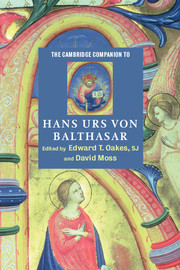1 - Introduction
Published online by Cambridge University Press: 28 May 2006
Summary
At least among professional theologians, Hans Urs von Balthasar tends to perplex more than he manages to inspire. To be sure, he can inspire. For example, the journal he founded, Communio, now appears in twelve languages (including Arabic). But subscribers never exceed the number - itself already quite small - usual for most other professional theological journals. More to the point, few Catholic departments of theology in Europe or North America consider it essential to have a Balthasarian expert on their respective faculties (a similar attitude towards liberation theology, transcendental Thomism, or feminist theology, by comparison, would seem vaguely revanchist).
To some extent, however, this situation has begun to change. In fact, this volume in the Cambridge Companion series testifies to what seems to be an incipient sea change in attitudes towards this unusually productive, subtle, and complex theologian. For that reason, the editors wish to stress that this collection of essays by a wide array of scholars wishes not so much to inspire as to address the perplexity that seems to be an inherent part of everyone’s reaction to Balthasar’s thought. We make no claim to have resolved the perplexity that so many readers feel upon encountering his theology for the first (or even umpteenth) time.
- Type
- Chapter
- Information
- Publisher: Cambridge University PressPrint publication year: 2004
- 2
- Cited by



